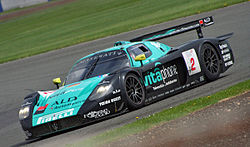Maserati MC12 Corsa
| Maserati MC12 | |
|---|---|
 |
|
| Overview | |
| Manufacturer | Maserati |
| Also called | MC12 Versione Competizione Maserati MC12 Stradale Maserati MCC (development codename) |
| Production | 2004-2005 (50+12 produced) |
| Designer | Frank Stephenson |
| Body and chassis | |
| Class |
Sports car Racing car |
| Body style | Coupé |
| Layout | Rear mid-engine, rear-wheel drive |
| Related |
Enzo Ferrari Ferrari FXX Maserati MC12 Corsa |
| Powertrain | |
| Engine | 6.0L F140 V12 |
| Transmission | Maserati Cambiocorsa semi-automatic transmission |
| Dimensions | |
| Wheelbase | 2,800 mm (110.2 in) |
| Length | 5,143 mm (202.5 in) |
| Width | 2,096 mm (82.5 in) |
| Height | 1,205 mm (47.4 in) |
| Curb weight | 1,335 kg (2,943 lb) (dry) 1,497 kg (3,300 lb) (kerb) |
| Chronology | |
| Predecessor | Maserati Bora |
 |
|||||||||
| Category |
FIA GT1 American Le Mans GT1 |
||||||||
|---|---|---|---|---|---|---|---|---|---|
| Constructor | Maserati | ||||||||
| Technical specifications | |||||||||
| Chassis | Carbon-fibre, nomex honeycomb monocoque chassis, front and rear aluminium safety subframes with roll cage | ||||||||
| Suspension (front) | Double wishbone, push rod operated over damper | ||||||||
| Suspension (rear) | As front | ||||||||
| Length | 5,143 mm (202 in) | ||||||||
| Width | 2,096 mm (83 in) | ||||||||
| Height | 1,205 mm (47 in) | ||||||||
| Axle track | Front: 1,660 mm (65 in) Rear: 1,650 mm (65 in) |
||||||||
| Wheelbase | 2,800 mm (110 in) | ||||||||
| Engine | Maserati 6.0 L (6,000 cc; 366 cu in) V12 naturally aspirated DOHC mid-engined, longitudinally mounted | ||||||||
| Transmission | Maserati Cambiocorsa 6-speed sequential semi-automatic paddle-shift gearbox | ||||||||
| Weight | 1,250 kg (2,760 lb) (FIA GT) 1,200 kg (2,600 lb) (ALMS) |
||||||||
| Fuel | Ethanol E10 | ||||||||
| Tyres | Michelin, Pirelli | ||||||||
| Competition history | |||||||||
| Notable entrants |
|
||||||||
| Notable drivers |
|
||||||||
| Debut | 2004 FIA GT Imola 500 km | ||||||||
|
|||||||||
| Teams' Championships | 6 (2005 – 2009 FIA GT, 2010 FIA GT1) | ||||||||
| Constructors' Championships | 2 (2005 FIA GT, 2007 FIA GT) | ||||||||
| Drivers' Championships | 6 (2006 Italian GT, 2006 – 2009 FIA GT, 2010 FIA GT1) | ||||||||
The Maserati MC12 is a limited production two-seater sports car produced by Italian car maker Maserati to allow a racing variant to compete in the FIA GT Championship. The car entered production in 2004, with 25 cars produced. A further 25 were produced in 2005, making a total of 50 cars available for customers, each of which was pre-sold for €600,000 ($670,541 USD)
Maserati designed and built the car on the chassis of the Enzo Ferrari, but the final car is much larger and has a lower drag coefficient. The MC12 is longer, wider and taller and has a sharper nose and smoother curves than the Enzo Ferrari, which has faster acceleration, better braking performance (shorter braking distance) and a higher top speed. The top speed of the Maserati MC12 is 330 kilometres per hour (205 mph) whereas the top speed of the Enzo Ferrari is 350 kilometres per hour (217.5 mph).
The MC12 was developed to signal Maserati's return to racing after 37 years. The road version was produced to homologate the race version. One requirement for participation in the FIA GT is the production of at least 25 road cars. Three GT1 race cars were entered into the FIA GT with great success. Maserati began racing the MC12 in the FIA GT toward the end of the 2004 season, winning the race held at the Zhuhai International Circuit. The racing MC12s were entered into the American Le Mans Series races in 2005 but exceeded the size restrictions and consequently paid weight penalties due to excess range.
Under the direction of Giorgio Ascanelli, Maserati began development of an FIA GT-eligible race car. This car, which would eventually be named the MC12, was initially called the "MCC" ("Maserati Corse Competizione") and it was to be developed simultaneously with a road-going version, the "MCS" ("Maserati Corse Stradale").Frank Stephenson did the majority of the body styling, but the initial shape was developed during wind tunnel testing from an idea had by Giorgetto Giugiaro. The MCC has a very similar body shape to the MC12, but there are several key differences, most notably the rear spoiler.Andrea Bertolini served as the chief test driver throughout development, although some testing was done by Michael Schumacher, who frequently tested the MCC at the Fiorano Circuit. During the development process, the MCC name was set aside after Maserati established the car's official name, MC12.
...
Wikipedia
